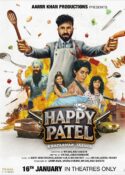 For Nawazuddin Siddiqui to be fully convincing as a Goan Catholic customs officer, he needed to first polish up his accent. “Deshing” (for dashing) and “impotent” (for important) just won’t do.
For Nawazuddin Siddiqui to be fully convincing as a Goan Catholic customs officer, he needed to first polish up his accent. “Deshing” (for dashing) and “impotent” (for important) just won’t do.
That said (and spoken), Siddiqui’s portrait of an angry government officer who won’t be bribed or silenced has its moments of strong impact, especially when Nawaz lets the simmering emotions of discontent spill over, defining the character more by what he feels rather than what he says.
There is a specially forceful monologue at the graveside where Siddiqui, the actor, lets the characters take over.
Such free flow of emotions is sadly rare and infrequent in this turgid-to-tepid biopic, which ticks all the ‘trite’ boxes but forgets to loosen up a bit. Sejal Shah’s direction is strictly by the numbers. The screenplay is on the hero’s side unconditionally. Costao was wronged. The film is designed to rectify the imbalance.
We get that. But we never know why Costao’s rigid, duty-bound attitude gets in the way of getting him justice when he is accused of murdering a smuggler.
Oh, by the way, this is Goa in the 1990s. So we gather. Nothing in the landscape or the characters’ spoken language suggests even a hint of periodicity. The film looks budget-challenged and makes no effort to hide its modest means and ambitions, but it gets by on the strength of the real-life hero’s tenacity.
Fatally, Nawaz shares zero kinship with his screen wife, played by the talented Priya Bapat, who was such a revelation in Applause Entertainment’s City Of Dreams. She is here reduced to doing everything that wives of idealistic government officers do in our cinema. Even Costao’s terrific bonding with his daughter (who narrates the story) falls short.
Very often, I felt like yanking the narrative out of its slush of cliches to reveal Costao Fernandes as more than a puppet hero. There is no opportunity for the character to grow, not when the dialogues constantly nudge him to speak like a pamphleteer rather than a wounded soldier whom the bureaucracy won’t allow to breathe.
The mood of suffocation that grips the narrative comes from knowing that Costao will be painted in strokes of heroism, come what way. Saddled with dialogues that rhyme “duty” with “beauty”, Nawazuddin struggles to make the protagonist seem genuinely affronted by the System. He succeeds marginally. The film, alas, doesn’t get anywhere close to success.











